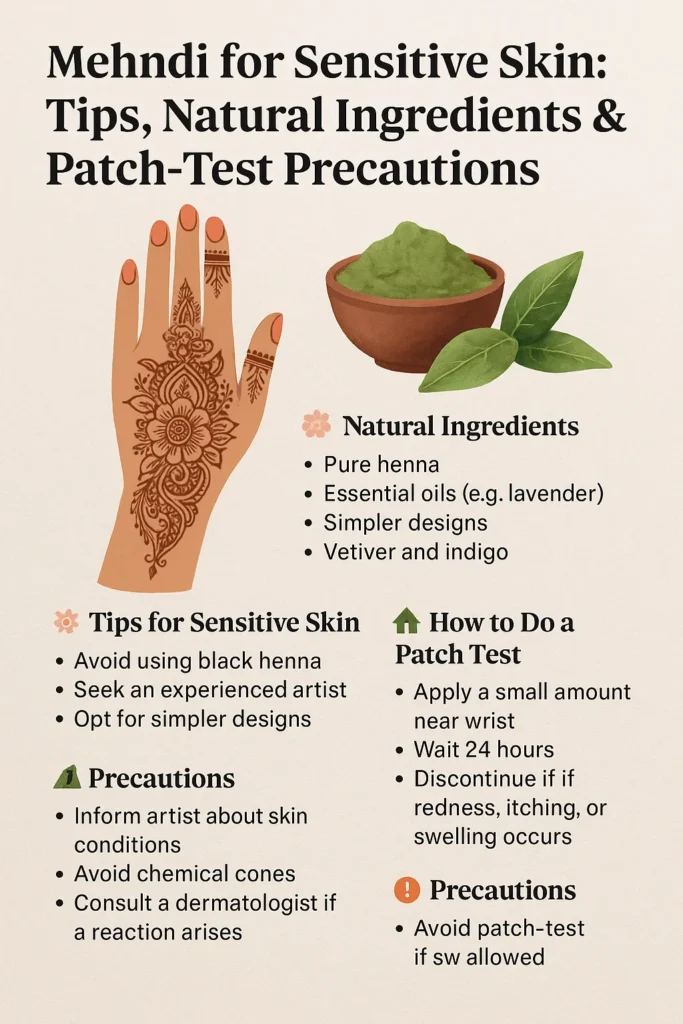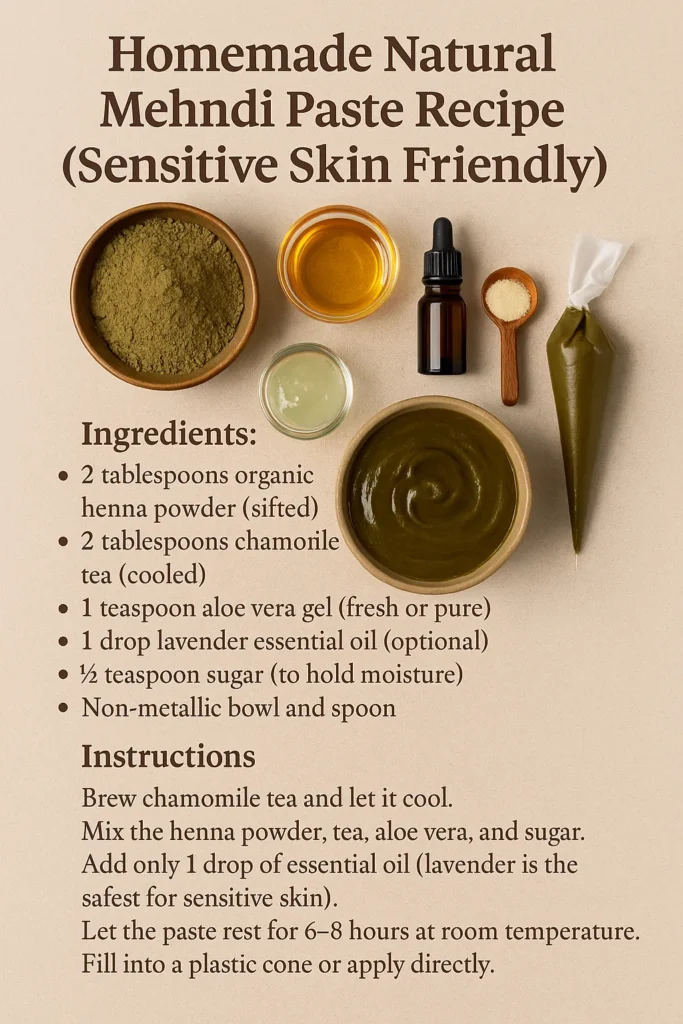Mehndi for Sensitive Skin: Tips, Natural Ingredients & Patch-Test Precautions (2025 Guide)
Introduction: The Joy and Challenge of Mehndi on Sensitive Skin
For centuries, mehndi (henna) has graced the hands and feet of women across cultures—symbolizing joy, celebration, and spiritual beauty. But for people with sensitive skin, what should be a beautiful ritual can turn into redness, itching, or worse—a full-blown allergic reaction.
If you’ve ever hesitated before getting mehndi because of skin irritation, you’re not alone. Sensitive skin can react to chemical additives, low-quality henna, or even natural ingredients if not handled correctly. But here’s the good news: with proper knowledge, natural alternatives, and careful patch-testing, even people with the most delicate skin can enjoy mehndi safely.
This guide walks you through everything you need to know: from what causes skin reactions to natural ingredients that soothe, smart DIY mehndi recipes, and expert-approved patch-test techniques. Let’s dive deep.
Understanding Sensitive Skin and Mehndi Reactions
Sensitive skin is not a diagnosis—it’s a condition where your skin becomes irritated easily due to various triggers. These may include harsh weather, stress, hormonal imbalances, or exposure to chemicals.
When it comes to mehndi, sensitive skin reacts mostly due to:
- Chemicals in pre-mixed cones (especially black henna)
- Preservatives or dyes added for long shelf life
- Essential oils in high concentrations (e.g., clove, eucalyptus)
- Allergic reactions to certain natural ingredients like lemon juice or sugar
Common symptoms include:
- Burning sensation
- Red patches or rashes
- Itchiness or peeling skin
- Blistering in extreme cases

In a 2024 dermatology study, over 32% of people with sensitive skin reported discomfort after applying pre-packaged mehndi cones—not due to henna itself, but due to chemical additives.
Is Henna Safe for Sensitive Skin? The Short Answer
Yes, pure, natural henna is generally safe for sensitive skin—when used correctly.
Natural henna powder made from dried Lawsonia inermis leaves contains no chemicals. It’s anti-inflammatory, antimicrobial, and even cooling—making it a traditional remedy in Ayurveda for skin inflammation.
But the key is this: you must know your source, avoid black henna, and always do a patch test.
Red Flag: Why You Should Always Avoid Black Henna
Black henna is NOT real henna. It contains a dangerous chemical called PPD (para-phenylenediamine) that gives a black stain but often causes severe allergic reactions.
Symptoms can include:
- Permanent skin scarring
- Blistering
- Long-term sensitivity
- In some cases, hospitalization
For sensitive skin, black henna is never safe. Avoid cones labeled “instant mehndi,” “jet black,” or “30-minute color.”
Always read the label—even if it claims to be herbal.
How to Choose Mehndi Products Safe for Sensitive Skin
Here are expert-backed tips to choose the right mehndi for sensitive skin:
✅ Buy organic henna powder from trusted brands (check for 100% natural ingredients)
✅ Avoid cones with chemical fragrance or no ingredient list
✅ Make your own mehndi paste at home with fresh powder
✅ Opt for short ingredient lists—fewer ingredients mean fewer chances of irritation
✅ Avoid using metallic utensils when mixing paste, as it can trigger reactions
Real example:
Riya, a bride from Jaipur, suffered peeling skin after using a store-bought mehndi cone before her engagement. Later, she switched to a homemade paste using organic henna and essential oils, and had a flawless bridal mehndi experience.
Homemade Natural Mehndi Paste Recipe (Sensitive Skin Friendly)
Here’s a gentle and safe recipe you can try at home:
Ingredients:
- 2 tablespoons organic henna powder (sifted)
- 2 tablespoons chamomile tea (cooled)
- 1 teaspoon aloe vera gel (fresh or pure)
- 1 drop lavender essential oil (optional)
- ½ teaspoon sugar (to hold moisture)
- Non-metallic bowl and spoon
Instructions:
- Brew chamomile tea and let it cool.
- Mix the henna powder, tea, aloe vera, and sugar.
- Add only 1 drop of essential oil (lavender is the safest for sensitive skin).
- Let the paste rest for 6–8 hours at room temperature.
- Fill into a plastic cone or apply directly.

This paste is mild, cooling, and gives a rich stain without irritating sensitive skin.
Natural Soothing Ingredients to Add in Mehndi for Sensitive Skin
Here are ingredients you can use to enhance your paste’s skin-friendliness:
| Ingredient | Benefit | Precaution |
|---|---|---|
| Aloe Vera Gel | Soothes, hydrates | Use pure gel only |
| Chamomile Tea | Anti-inflammatory | Brew mild, not strong |
| Rose Water | Cools skin | Use organic, preservative-free |
| Sandalwood Powder | Healing, fragrance | Patch test before use |
| Lavender Oil (1 drop) | Calms skin, mild scent | Do NOT overuse |
Patch-Test Precautions: Your First Safety Step
No matter how safe the paste, a patch test is non-negotiable.
Here’s how to do it:
- Apply a small dot of the prepared paste on the inside of your elbow or wrist.
- Let it dry for 3–4 hours.
- Scrape off without washing.
- Wait for 24 hours.
If you notice:
- No redness, itching, or burning → You’re good to go.
- Any irritation → Do NOT use on larger areas. Reformulate your paste or consult a dermatologist.
Pro Tip: Never test near the face, neck, or sensitive areas first.
Post-Mehndi Care for Sensitive Skin
Even if you pass the patch test, proper aftercare is essential.
🖐️ After scraping the mehndi off:
- Avoid washing with water for 12–24 hours
- Use coconut oil or aloe vera gel to moisturize
- Don’t expose hands to soap, detergent, or sanitizer
- Avoid direct sunlight for at least 24 hours
If you feel even slight tingling, use a cold compress and apply a soothing balm like Calendula cream.
What If a Reaction Still Occurs?
Even with all precautions, if your skin flares up:
- Wash gently with cold water
- Apply an ice pack or calamine lotion
- Avoid scratching the area
- Use aloe vera gel or rose water-soaked cotton
- Visit a dermatologist if redness, swelling, or burning persists beyond 24 hours
Never apply steroid creams or medicines without medical advice.
FAQs: Mehndi for Sensitive Skin
Read More: Healed Mehndi Designs: What They Look Like After 3, 5 & 7 Days (With Tips to Maintain Beauty)
Q: Is natural henna always safe?
A: Pure henna is generally safe, but every skin is different. Always do a patch test.
Q: Can I use white henna instead?
A: White henna is usually body paint, not natural. Check the ingredients for sensitivity.
Q: What’s the safest oil to mix with henna?
A: Lavender or tea tree (only 1–2 drops). Avoid clove or eucalyptus—they’re too harsh.
Q: My child has sensitive skin. Is mehndi safe?
A: Yes, if it’s made fresh with mild ingredients and tested in advance.
Tips from Real Sensitive Skin Users (2025 Interviews)
🌸 Anjali, 29 (Mumbai): “I switched from chemical cones to making my paste with rose water and aloe vera. My skin no longer burns.”
🌸 Zara, 32 (Dubai): “I only apply mehndi on my feet now, where the skin is less sensitive. I use chamomile water to mix the paste.”
🌸 Deepa, 24 (Bangalore): “My mehndi artist uses a cone made just for me with zero essential oils. I still get a beautiful stain.”
These lived experiences show that sensitive skin doesn’t mean saying goodbye to mehndi—it just means being cautious and smart.
Conclusion: Celebrate Without Compromise
Sensitive skin should never stand between you and your love for mehndi. With the right ingredients, smart testing, and gentle care, you can enjoy the elegance of mehndi just like anyone else—without the fear of rashes or reactions.
Choose natural, test before you apply, and let your mehndi journey be joyful, soothing, and stain-deep.
Written by:
Anjali Mehta,
A certified mehndi artist and skin-care writer with over 12 years of experience, Anjali specializes in safe henna practices for sensitive skin. Her work blends traditional henna knowledge with modern skincare insights to help people enjoy mehndi safely and beautifully.

